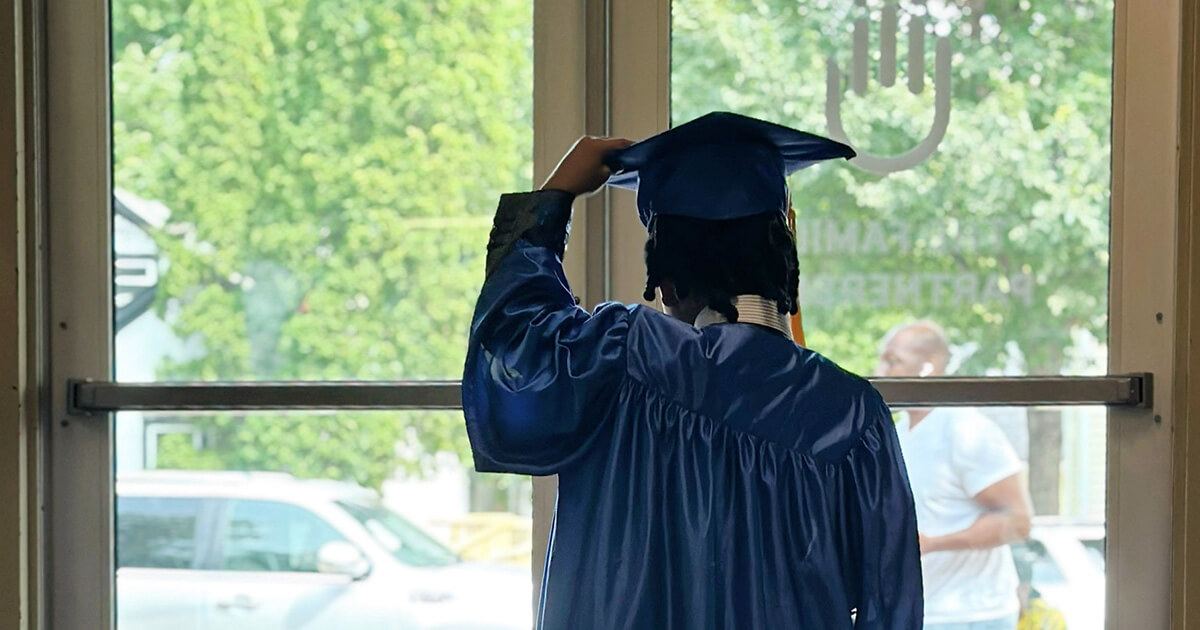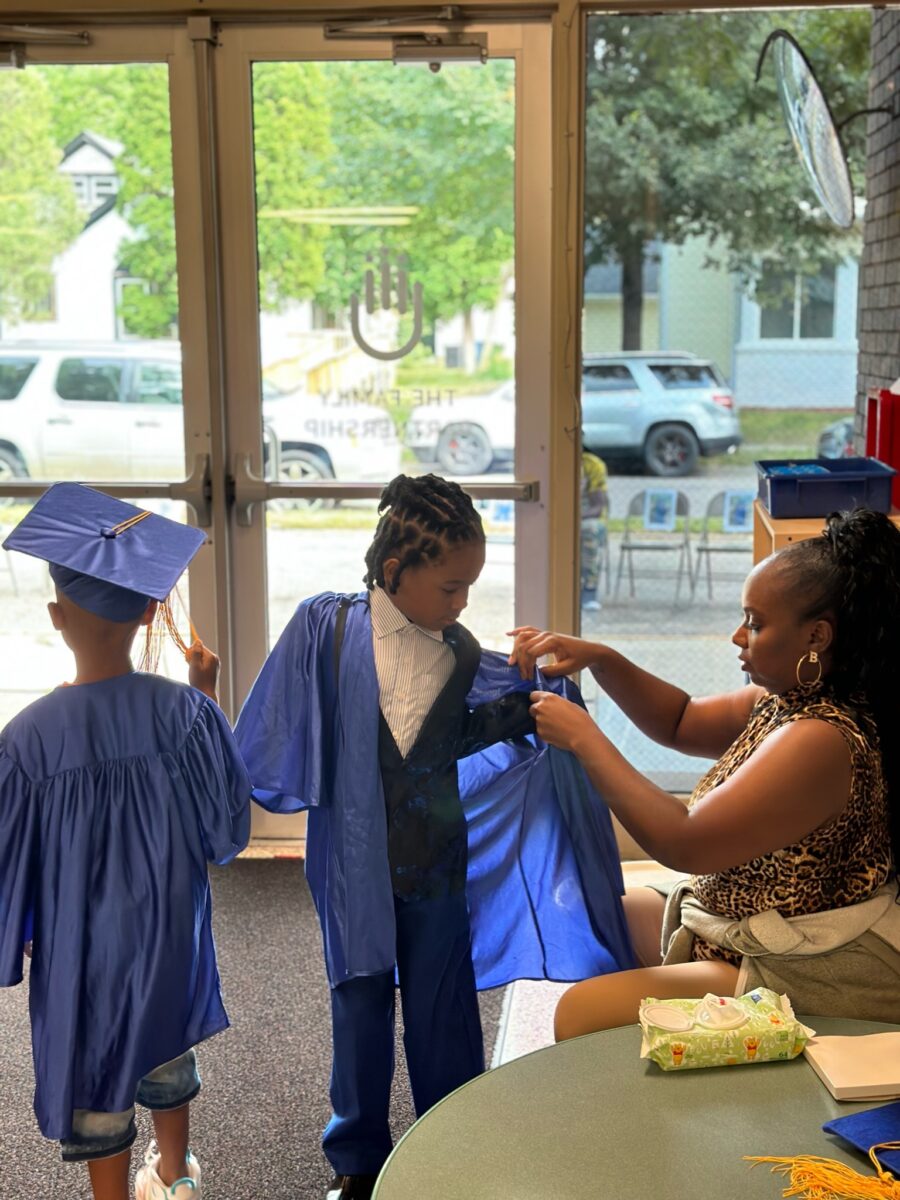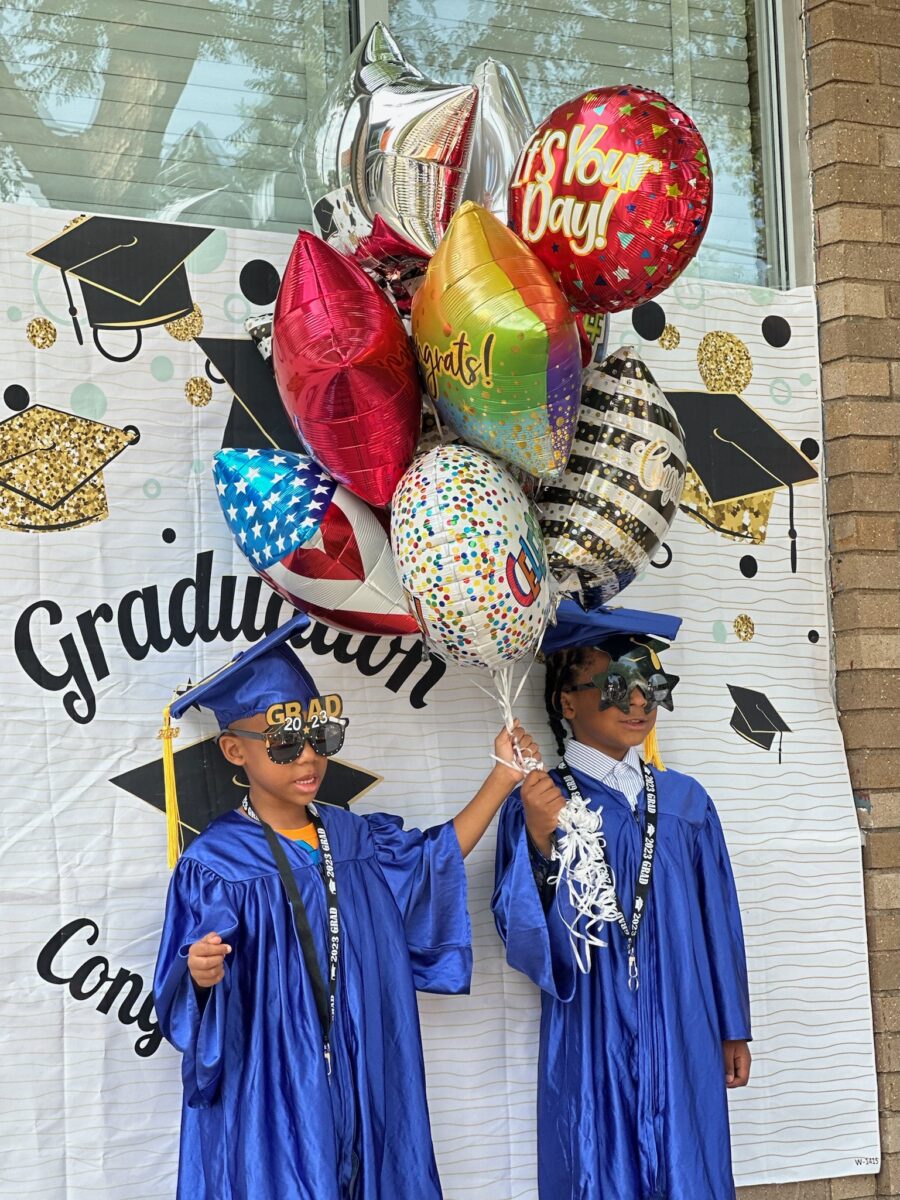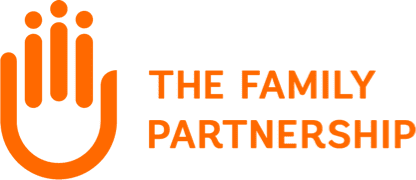Celebrating Preschool Graduation and Advancing Equity through Early Education

North Minneapolis Preschool’s recent graduation ceremony marked an important threshold in the lives of two young scholars, Miles and Zayvior. On one side are their earliest learning experiences; on the other, a lifetime of learning. After all, many studies show that children who have a strong foundation for learning in their early years are more likely to achieve success in school, work, and life.
The ceremony happened on a hot August afternoon, with the boys dressed in blue caps and gowns, surrounded by proud family members and staff, cupcakes and balloons. Zayvior and Miles listened as Cassaundra Davis, Preschool Director, reflected on their roles as leaders in their early learning community. “They were big contributors to their classroom. They were kind of the big brothers here, and I know they will be missed by the kids and by the teachers as well. And I know nothing but great things are going to happen for them.”
They were big contributors in their classroom. They were kind of the big brothers here, and I know they will be missed by the kids and by the teachers as well. And I know nothing but great things are going to happen for them.”
Cassaundra Davis, Director of North Minneapolis Preschool
Preschool graduation is more than a celebration for children and their families, because early learning matters for entire communities. Harvard University’s Center on the Developing Child even calls early childhood education “the foundation for a prosperous and sustainable society.”
In an equitable world, every young child would access quality early learning opportunities and enjoy this kind of ceremony. For now, there is still work to do to make that dream a reality.
Preschool graduation is more than a celebration for children and their families, because early learning matters for entire communities.
Opportunity gaps begin in early childhood
The truth is that opportunity gaps existing in Minnesota make that reality out of reach. Minnesota has the second worst racial inequities in the nation when it comes to economic opportunities and outcomes and those inequities begin in early childhood. According to an article published by the Federal Reserve Bank of Minneapolis, “disparities in social and economic conditions and health care access influence” school readiness, and “data suggest early-life inequalities like these are difficult to close.”
The reason why early childhood is so important to later success in life is due to the lightning-fast pace of brain development in our first years of life. Our brains are shaped by our experiences and research has shown that to be particularly true from the prenatal period through age five. When young children experience adverse childhood experiences (ACEs), including abuse, neglect, or family dysfunction, these experiences impact their brain development, which then impacts the executive functioning and self-regulation skills needed for success in learning environments.
The impact of ACEs goes beyond the household to include systemic expressions like racial and economic injustice. According to a recent study published in the According to a recent study published in the Journal of Child & Adolescent Trauma, there are a “myriad of consequences linked to racial discrimination” for Black youth in particular that include “decreased psychological, behavioral, and emotional functioning.” Harvard University’s Center on the Developing Child notes that multiple studies show the impacts of racism on children and caregivers including higher stress responses, heavier mental health burdens and worse health outcomes.
In Minnesota, African American and American Indian adults have three times the Adverse Childhood Experiences (ACEs) scores of their white peers. While 7% of white adults report 5 or more ACEs, 19% of African American and Black and 23% of American Indian adults reported the same.
It is important to recognize that systemic racism has led to different access to resources in our communities which impacts living conditions as well as the physical and mental health of all members of families. The connection between systemic injustice and ACEs cannot be ignored.
In recent years, systemic inequities were made worse in Minneapolis by the COVID-19 pandemic and the trauma associated with police brutality. State data shows that the age-adjusted excess mortality rate from COVID-19 was significantly higher for Black, Latino, Asian/Pacific Islander, and Native Minnesotans than white Minnesotans. And in the the week following George Floyd’s murder, more than 51% of Black Minnesotans reported feeling anxious or depressed compared with 29% of White Minnesotans. A study published in Proceedings of the National Academy of Sciences (PNAS) explains how direct and vicarious trauma from police brutality leads to “downstream effects” on Black Americans, including:
- Physical health and mortality
- Social and family relationships
- Economic hardship and precarity
Since 2020, the communities served by The Family Partnership have experienced increased food scarcity and higher rates of violent crime. Additionally, families experienced increased isolation and uncertainty navigating multiple years of a public health emergency, and young children lost opportunities for learning and socialization outside of the home. Young children entering preschool in Minneapolis today were born in this context and face greater developmental challenges than before.
Addressing racial disparities in early education can lead to bigger social change now and in the future
Even with these heavy realities, research has shown that high quality childcare and preschools can help to buffer children against ACEs and close opportunity gaps. John Everett Till, Senior Vice President of Strategy and Innovation for The Family Partnership, says, “The issue is always–do families have access to high quality early education? For many Native American and Black families, the answer to that question is ‘no.’”
The Learning Policy Institute identifies the following factors as some essential elements of quality programs:
- Sufficient learning time
- Small class sizes
- Low student-teacher ratios
- Well-prepared teachers who provide engaging interactions
- Ongoing support for teachers, including coaching and mentoring
- Research-based, developmentally appropriate early learning standards and curricula
- Meaningful family engagement

Research has shown that high quality childcare and preschools can help to buffer children against ACEs and close opportunity gaps.
The Family Partnership is committed to addressing the roots of opportunity gaps through early childhood education and care, meeting the standards outlined above. But our efforts go beyond them as well. Our preschools, Four Directions and North Minneapolis Preschool, prioritize small class sizes with highly trained teachers who reflect the diversity of the students and families we serve. Both of our locations are in neighborhoods experiencing the greatest disparities. We also provide developmental assessments to identify any challenges children might be facing and provide access to onsite developmental therapies, dental and vision screenings as well.
We use a groundbreaking preschool curriculum that buffers against ACEs and prepares children for kindergarten success
Our preschools are some of the first programs in the nation to implement our Executive Function Curriculum, a two-generation toolkit to build lifelong resilience and focus. Executive function skills are the number one predictor of success in school, work, and life, but can be disrupted by ACEs and toxic stress. Our curriculum is designed to reduce the harmful effects of trauma and close opportunity gaps for young children so they can better fulfill their potential.
With evaluation support from Harvard Center on the Developing Child and the Center for Early Education and Development at the University of Minnesota, our curriculum has demonstrated a significant impact on executive functioning skills like emotional descriptive language, positive age-appropriate behavior, and storytelling.
Our curriculum is designed to reduce the harmful effects of trauma and close opportunity gaps for young children so they can better fulfill their potential.
Our teachers receive training on the curriculum and ongoing support to make sure that it is easy and practical to use. Beginning this fall, parents and caregivers will also utilize the curriculum in a special home-visiting format that gives children more opportunities to build their skills. Thanks to the power of brain science and strong partnerships between teachers and parents, children in our preschools flourish.
What does preschool success look like?
Preschools prepare children to enter kindergarten, the beginning of their formal education. So, success for preschool is most often defined as kindergarten readiness.
A child is kindergarten-ready as defined by the State of Minnesota when the student has “knowledge and skills across multiple development and learning areas and will exhibit physical health and emotional well-being.”
According to an article published by the National Association for the Education of Young Children (NAEYC), kindergarten readiness skills look differently for every child based on their unique experiences. The State of Minnesota includes the readiness of communities, early childhood care and education, elementary schools, and families as essential parts of a child’s success in school.
The Family Partnership uses established measures to assess each child’s progress in our preschools. Assessments align with Minnesota’s early childhood indicators for progress and include the following learning domains:
- Social and emotional development
- Approaches to learning
- Language, literacy, and communications
- Creativity and the arts
- Cognitive development: mathematics, science and social systems
- Physical and movement development
We are thrilled to report that in 2023, 100% of the students at our North Minneapolis Preschool and our Four Directions Preschool in South Minneapolis tested kindergarten-ready. That’s compared with a 60% Minnesota state average kindergarten readiness rate, and 52% kindergarten readiness rate for children from low-income households.

We’re proud of the young scholars who graduated from our preschools this summer. We congratulate each young scholar on their hard work and trust that they will bloom in kindergarten and beyond! They and their families are part of a generational healing movement in Minneapolis and leaders in showing how early education can be a powerful force for advancing equity in Minnesota.
